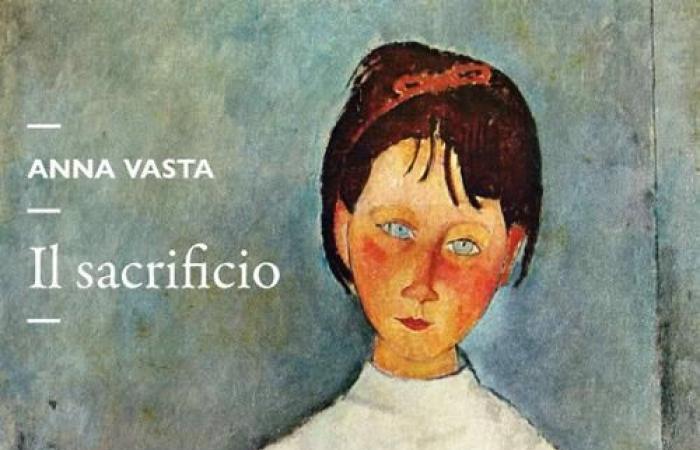“The sacrifice” by Anna Vasta (Carthago): meeting with the author and an excerpt from the book
* * *
Anna Vasta she was born in Catania and lives in Riposto (CT). A teacher of literary subjects, she collaborates with critical reviews on the cultural pages of the newspaper “La Sicilia”, Letteratitudine, Pelagos and Academia.edu.
He has published various texts including poetry and non-fiction. His first novel, entitled “Sacrifice“.
We asked the author to tell us about it…
* * *
«Sacrifice it is my first novel (Carthago 2024),” he said Anna Vasta to Literality.
«For years I have written and published poems, short essays of poetry and aphoristic prose.
The transition from poetry to fiction happened naturally, without forcing, not a plan, nor a goal. As in life, so in literature it is often chance that guides events and choices. The best things are written when you have nothing to say.
It is then that all that is unsaid, buried under the snow, surfaces. An insignificant detail, a failed act, an involuntary gesture, is enough for the formless to take shape, generating plots, events, destinies that are defined as they unfold.
Perhaps I was looking for a story to tell myself and to share with my readers who were interested in my poetic discourse, but who expected – and had asked me several times – that I would develop the narrative ideas in a novel.
Life is made of stories, of characters that we often don’t recognize as such. Even literature has its plots, its events, sometimes truer than the real ones. His life runs parallel to his real life. It may happen that they meet at a junction, like two trains connecting and exchanging passengers. Then they continue their race, each towards their last station.
Narrating is like unraveling the intricate material of a dream. In the dream, the experiences of the day return in disguise, camouflaged and we do not recognize them. In the waking state we try to give order to the anarchy of the dream, by telling it, but we are only trying to fill its voids, its black holes with pieces of our life.
I believe we use the same procedure when we tell stories. Let’s fill the gaps in narrative fiction with the material of our experiences.
There are no novels or stories that are not linked to our biography.
In a narrative context of reality, even an invented story becomes true, alive with its own life borrowed from other lives. First of all ours, whose waste we lost along the way.
Marianna, the last heir of a landed bourgeoisie family of an Etna village with ancient medieval traditions, is the leading figure of a dramatic family affair that happened more than twenty years before her birth, and hidden like dust under the carpets. The girl takes on the burden of bringing the story to light and completing it. About her Split between her experiences as a daughter of the sea, raised and trained in the harshness of her life by her fishermen, and the painful memories of her father, son of the black earth, uprooted from it and transplanted into a fleeting sea. Infected by her father’s tormenting nostalgia for an unresolved past, she begins her own personal journey of getting to know a place, a time that does not entirely belong to her, but to which she is strongly attracted. Every path of knowledge is not immune to suffering and Marianna faces it to the end with determination, without holding back, like her fishermen, from the seas.
The loss of innocence is the price to pay for an imperfect knowledge, of half-truths, fallacious, illusory that cancel each other out in the great sea of universal illusion that dominates us and in which we adapt to live, to survive. For Marianna too comes the Leopardian moment of disenchantment, of the doubt that her strawberry place, the mountain village where her father was born and raised until adolescence, with the vineyards inflamed by the sunsets, the whiteness of the snow-covered pine forest, already after the Dead, the smell of the must in September, the pristine blue of the sky that soared above the crumbling buildings in Sant’Egidio, might not be that Eden that he had glimpsed in his fervent imagination. For everyone there comes that moment when the sand castles of childhood memories collapse and reality reveals itself to us in smaller dimensions. But maturity takes over when under the rubble of an invented childhood, it is discovered that lost time survives in a new-found time. That the ashes have fertilized the soil and, as on the old lavas of the vineyard land, life returns among the lichens and moss.
The main character who moves the threads of the narrative, directing it towards a solution with a strong dramatic impact is not autobographic, however I recognize myself in him. As every author can say of his characters that they are his children, so of Maranna, of Caterina, and of Santina, of Egidia and of Concetta-“unprecedented figures of women, apparently alive, but worm-eaten in a wooden life”(Paolo Manganaro)–I have no reservations in saying that they belong to me, that they have taken shape and identity from an intuition of reality that foresees good and evil, love and its degenerations, uncontrollable impulses, which in particular circumstances can take the path of crime and lead to crime.”
* * *
The incipit of “The sacrifice” by Anna Vasta (Carthago, 2024)

In that portrait, which stood out in the old damask living room, above the basalt fireplace, among the tapestries and paintings with glimpses of a snow-covered pine forest, slopes of golden broom and clearings of purple gentians as at the Sepulchers in the days of Passion, Egidia and Santina stood out from the purple background as if from the wings of a stage at the Teatro Massimo, Bellini, anxiously waiting for the melodrama to begin.
The head bowed, the gaze dreaming, they looked like two blooming May roses, of those that overflow from the walls of patrician palaces, now decrepit, but which still smell of mold and rosemary.
With the petals of dried Maioline roses and the juice of freshly picked strawberry grapes, in the vineyards of the Etna villages, a refined liqueur was made which was tasted on the Day of the Dead and offered to relatives and friends, together with dried figs and fruit. of marzipan.
Strawberries, cherries, apricots, grapes the color of wine from the pastry shop windows brought back the flavors of summer.
To little Marianna they seemed like still lifes; that’s what her father called the prints with fruit trays and skulls clearly visible on a dark background that covered the dining room at the Linguaglossa cousins’ house.
Looking at them took away your appetite. In the riot of flavors and smells of the laid table, they froze like a memento mori.
The two spinsters had a passion for those prints.
Even in the dining room of Marianna’s house in Riposto, above the inlaid mahogany table clearer, a still life stood out with a basket of pomegranates, prickly pears, and bunches of grapes the color of acacia honey, similar to those hanging from the pergola of the terrace .
They radiated a golden light that invited the pleasures of life.
For years the same press had brightened the kitchen of Anna, Marianna’s paternal grandmother.
That still life, more alive than the living one, united grandmother and granddaughter in an elective correspondence more stringent than the blood bond. It ignored the flow of existence in its crucial moments and random coincidences – the death of the grandmother on the same day as the birth of her granddaughter. She was fueled by a humus of memories migrating to different places and times, as happens in dreams.
The cousins’ prints clouded even the sunniest of days. They troubled Marianna like an omen.
(All rights reserved)
© Carthago
* * *
Book details: “The sacrifice” by Anna Vasta (Carthago, 2024)
A story of ordinary madness that leads to crime in the mid-1940s, between the fall of fascism and liberation. Buried for decades under mounds of removal and reticence, in a family context of the landed bourgeoisie of a semi-feudal Sicily, anchored to atavistic class prejudices and a criminal sense of honour, the dramatic story resurfaces from the mists of the past more than twenty years ago After. When the young Marianna, the last heir of the family, born and raised in a seaside town, in times of turmoil and radical transformations, after finishing high school, begins to rummage through the unspeakable secrets of her father’s family, to reconcile herself with the childhood memories of that dark land where the crime took place… And where its roots lie.
* * *
 Anna Vasta she was born in Catania and lives in Riposto (CT). A teacher of literary subjects, she collaborates with critical reviews on the cultural pages of the newspaper “La Sicilia”, Letteratitudine, Pelagos and Academia.edu.
Anna Vasta she was born in Catania and lives in Riposto (CT). A teacher of literary subjects, she collaborates with critical reviews on the cultural pages of the newspaper “La Sicilia”, Letteratitudine, Pelagos and Academia.edu.
Published:
Refutation of religions (Translation of dialogues L-LX of De Admirandis naturae by Giulio Cesare Vanini with preface by Manlio Sgalambro, De Martinis & C, Catania, 1993
For poetry:
The Curve of the Sky(Amadeus Editore, Soligo, 1999);
The Malnati(I Quaderni del Battello Ebbro Editore, Porretta Terme, 2004), finalist with honorable mention at the Brancati Zafferana Award 2005;
Lenten(Prova d’Autore, Catania, 2006);
Bride of the wind(Prova d’Autore, Catania 2008);
Of a ghost and seas(Prova d’autore, Catania 2011);
Violated skies (Ensemble Editions, Rome, 2013).
For non-fiction: The white test (Aphorisms). Le farfalle Editions, Valverde, 2015.
* * *
© Literality – www.letteratitudine.it
LetteratitudineBlog / LetteratitudineNews / LetteratitudineRadio / LetteratitudineVideo
Follow us on Facebook – X (formerly Twitter) – Tumblr – Instagram – Threads








